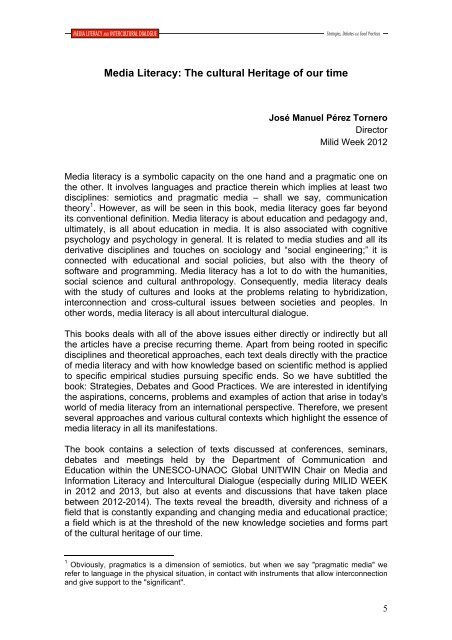Libro
Libro
Libro
Create successful ePaper yourself
Turn your PDF publications into a flip-book with our unique Google optimized e-Paper software.
MEDIA LITERACY AND INTERCULTURAL DIALOGUE<br />
Strategies, Debates and Good Practices<br />
<br />
Media Literacy: The cultural Heritage of our time<br />
José Manuel Pérez Tornero<br />
Director<br />
Milid Week 2012<br />
Media literacy is a symbolic capacity on the one hand and a pragmatic one on<br />
the other. It involves languages and practice therein which implies at least two<br />
disciplines: semiotics and pragmatic media – shall we say, communication<br />
theory 1 . However, as will be seen in this book, media literacy goes far beyond<br />
its conventional definition. Media literacy is about education and pedagogy and,<br />
ultimately, is all about education in media. It is also associated with cognitive<br />
psychology and psychology in general. It is related to media studies and all its<br />
derivative disciplines and touches on sociology and “social engineering;” it is<br />
connected with educational and social policies, but also with the theory of<br />
software and programming. Media literacy has a lot to do with the humanities,<br />
social science and cultural anthropology. Consequently, media literacy deals<br />
with the study of cultures and looks at the problems relating to hybridization,<br />
interconnection and cross-cultural issues between societies and peoples. In<br />
other words, media literacy is all about intercultural dialogue.<br />
This books deals with all of the above issues either directly or indirectly but all<br />
the articles have a precise recurring theme. Apart from being rooted in specific<br />
disciplines and theoretical approaches, each text deals directly with the practice<br />
of media literacy and with how knowledge based on scientific method is applied<br />
to specific empirical studies pursuing specific ends. So we have subtitled the<br />
book: Strategies, Debates and Good Practices. We are interested in identifying<br />
the aspirations, concerns, problems and examples of action that arise in today's<br />
world of media literacy from an international perspective. Therefore, we present<br />
several approaches and various cultural contexts which highlight the essence of<br />
media literacy in all its manifestations.<br />
The book contains a selection of texts discussed at conferences, seminars,<br />
debates and meetings held by the Department of Communication and<br />
Education within the UNESCO-UNAOC Global UNITWIN Chair on Media and<br />
Information Literacy and Intercultural Dialogue (especially during MILID WEEK<br />
in 2012 and 2013, but also at events and discussions that have taken place<br />
between 2012-2014). The texts reveal the breadth, diversity and richness of a<br />
field that is constantly expanding and changing media and educational practice;<br />
a field which is at the threshold of the new knowledge societies and forms part<br />
of the cultural heritage of our time.<br />
1 Obviously, pragmatics is a dimension of semiotics, but when we say "pragmatic media" we<br />
refer to language in the physical situation, in contact with instruments that allow interconnection<br />
and give support to the "significant".<br />
5



